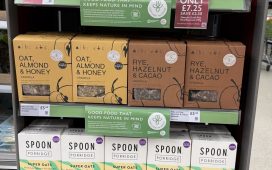As the adage goes: good things come in small packages. According to alcohol industry experts British consumers are increasingly choosing to enjoy their beverages in smaller portions, but of higher quality – fuelling a trend for 100ml taster bottles.
The shift comes from a desire to be healthier, experts say, with drinking among UK teenagers and young people falling. In June 2023, Tesco sold 25% more low- and non-alcoholic beer than in dry January.
Richard Halstead, the chief operating officer for consumer research at drinks market analysts IWSR, said: “We are certainly seeing smaller pack formats launched across categories to cater to moderation trends and also financial factors. These smaller sizes lower the cost barriers to entry and encourage the trial of new products or categories.”
He added: “The evidence from mainstream wines suggests that consumers see smaller servings (eg cans) of wine generally as convenient, and promote the idea of portion control, but are reluctant to buy them as they often don’t represent good value compared with a standard bottle.”
Halstead said that with fine wine “this innovative approach makes a lot of sense in terms of the moderation drivers, as wine is a category that due to packaging norms caters less to moderation.”
He added: “You typically either need to be able to share a bottle or be able to finish it within a couple of days. These smaller formats which enable a consumer to have a smaller portion of premium quality products cater to the motivations to drink less, but not compromise on the quality of a product.”
Matt Day, the owner of Daygustation, an independent wine shop and bar in east London, said: “Drinking a whole bottle just doesn’t fit with the healthy lifestyles of many people these days, yet until now very few decent wines have been available in a small format.”
Day’s shop has started offering handcrafted and fine wines, apart from sparkling ones, in 100ml “taste tubes”. They can be taken away in the 100ml tubes with prices from £5 for Azevedo Vinho Verde 2022 (a bottle is £14.95).
Naked Wines, an online wine retailer, also offers packs of 100ml pouches for its tasting events, sent out by post. This Christmas it also launched its first Advent calendar with samples in it, which sold out within weeks.
Marks & Spencer said sales of its small wine bottles (25cl) had increased by 30% year on year, with wine cans showing similar growth over the same period. It sells four different sparkling wines and seven still wines in half bottles.
It is not just winemakers going smaller. Cotswolds Dry Gin has launched a full-strength gin, designed to reduce the amount needed in a gin and tonic. It does this while keeping the strong flavour. Craft beer in 330ml cans is also a top seller.
Law changes are also helping, with variations in the sizes of bottles available. In December, the government gave the green light for sstill and sparkling wine to be sold in 200ml, 500ml and 568ml (pint) sizes in 2024, alongside existing measures.
Mark Driver, who co-owns the wine business Rathfinny, now sells 50cl sparkling wine bottles. He said: “Young wine drinkers care about where wine comes from and its quality. They seem to have more interest in the craft, and drink less than the millennials. I am not sure why but perhaps it started with craft beer and gin and has spread to wine.”
It comes after researchers at the University of Cambridge found that taking the largest serving of wine – usually 250ml – off bar menus could help the nation’s health and would not hurt pubs’ profits.
Ryan Chetiyawardana, a bartender at the Lyaness and Seed Library bars in London, said there had “certainly been a shift from bigger drinks to more balanced ones in a wider sense – this has always been part of the cocktail bar world, but it’s starting to be adopted across the board as more venues focus on the quality of their offerings.”










